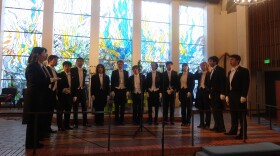PARIS — In a shocking move on Wednesday, the International Olympic Committee moved to crush U.S. inquiries into a Chinese sports doping scandal, by threatening to reject Salt Lake City's bid to host the Winter Games in 2034.
In a series of fierce statements coordinated by IOC President Thomas Bach, top IOC committee members blasted U.S. officials for opening probes into handling of the China case by the World Anti-Doping Agency (WADA).
Ingmar De Vos, an IOC committee member from Belgium said a probe by the U.S. Congress and a criminal investigation launched by the U.S. Department of Justice "are extremely worrying and basically, for us, unacceptable."
In an unprecedented move, the IOC demanded that officials in Utah — along with U.S. Olympic and Paralympic Committee (USOPC) — sign a contract affirming "respect" for the authority of WADA in exchange for Wednesday's agreement to hold the 2034 Winter Games in Salt Lake City.
Speaking in Paris just ahead of the vote, the chair of the USOPC, Gene Sykes, said he agreed to the binding language.
"We certainly respect the obligations and responsibility inherent in the amendment to the Olympic host contract," Sykes said.
If the U.S. doesn't comply by accepting WADA's authority, Salt Lake City's status as a host city could be revoked.
But many American athletes say they don't trust WADA's procedures and want probes to continue.
"What the athletes think, they want transparency," said Katie Ledecky, the star U.S. swimmer, who spoke at a separate press conference on Wednesday. "They want further answers to the questions that still remain."
In a statement, Travis Tygart, head of the U.S. Anti-Doping Agency (USADA), blasted the IOC for linking the China scandal to Salt Lake City's bid.
"It is shocking to see the IOC itself stooping to threats in an apparent effort to silence those seeking answers," Tygart said. "It seems more apparent than ever that WADA violated the rules and needs accountability and reform."
The case of 23 Chinese swimmers
The China scandal involves 23 swimmers who tested positive for banned performance enhancing substances on at least two occasions prior to the Tokyo Summer Games in 2021.
WADA officials have acknowledged keeping the test results secret until they were revealed by journalists this spring.
Eleven of those athletes are expected to compete again in Paris.
WADA president Witold Banka said at a press conference in April his organization did nothing wrong.
"At every stage, WADA followed all due process and diligently investigated. If we had to do it over again now, we would do exactly the same thing," Banka said.
On Wednesday, members of the IOC said they agreed with WADA's decision to accept a claim by Chinese officials that the positive tests were the result of accidental contamination.
But the case has sparked a growing firestorm of criticism in the U.S., from members of Congress, sports doping experts, and Olympic athletes.
USADA's Tygart, whose organization monitors and penalizes American athletes if they cheat, testified before a House panel in June that WADA had failed for years to properly punish Chinese and also Russian sports teams that regularly use performance-enhancing drugs.
"Russia and China have been too big to fail in [WADA's] eyes and they get a different set of rules than the rest of the world does unfortunately," Tygart said.
IOC officials say that kind of criticism — and the DOJ probe in particular — threaten to destabilize the international sports doping regimen and could put sports officials at risk when traveling to the U.S.
De Vos, from Belgium, complained on Wednesday that U.S. actions are "clearly intended to undermine the role of WADA and trust in the global anti-doping system."
Salt Lake City officials blindsided by scandal
At a press conference in Paris on Wednesday, officials from Utah said this controversy hit their Olympic bid "out of the blue" and forced them to scramble for a solution.
Fraser Bullock, who heads the Salt Lake City bid, told reporters he was comfortable signing the contract promising fealty to WADA and its rulings.
"I'm very sympathetic to how the international sports federations feel," Bullock said. "They're worried."
It appears unlikely that this power move by the IOC will quell criticism, especially among members of Congress who are fiercely skeptical of WADA and its ties to China.
USOPC officials said on Wednesday they'll work with the DOJ, members of Congress and athletes to try to improve international sports doping procedures while also de-escalating the controversy.
But American swimmers who are set to compete against Chinese athletes implicated in this scandal say they don't have confidence in WADA's methods or its fairness.
"I hope everyone here is going to be completing clean here this week," said Ledecky. "But what really matters also is were they training clean?"
Copyright 2025 NPR







